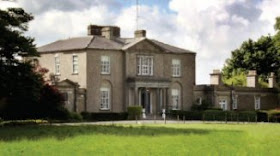First Published in Carty's
Poetry Journal Christmas 2011
I come bearing sheets of forked ideas
and web-linked names of strangers
from whose loins I'd sprung.
I come as a city dweller,
to find in what small and mean house, or field,
my predecessors had struggled, unaware as yet
that more could be known
than the next harvest, the next child.
At first I found three modern houses,
complete with double garages, new cars,
and trampolines; each fresh house
with an apron of closely
manicured useless grass,
whose clippings, heaped to rot, led me up the lane way
to where the ditch was still
agrowing,
and the years were taken back
to when the moss covered stones,
were still naked in their busyness,
and when a bend was first turned,
. . . . for God knows what reason.
It is to this bend I go now
this willful or unconscious hieroglyph,
where one man stopped
and made our family’s home.
I find the first, weathered and decaying house,
single storied, single roomed, one eyed and open mouthed, silent in its memories of house proud ornament,
busy courtesan hens, and other 'yard to pots.'
At the second house, a horse waited, half-door open,
I was recognised.
as one of those who braided straw to bend its will,
and so, it tipped its head and snorted.
We gazed; exchanging memories, and
I saw in his stead, Maureen, and Delia,
mother and farmer’s daughter,
names I know from a census night,
that were impressed by pen, clumsy in thickened hand, listing
proudly read and write;
English for the future,
English and Irish, for the past.
Three cottages in all, with no door facing another
so each man, father and son,
could leave in the
morning and go his own way.
From here, at the age of fifteen, my
great-grandfather,
had left and crossed the fields to another
farm,
picked by the same calculation and observation,
he learned at the side of a towering leg,
that was never
uncovered, never revealed, as flesh.
Even in death, those trunks had remained so,
covered by a shroud
that strangely stretched from chin to toe,
and those great hands that had spread seed,
were now knuckled, and bound
that strangely stretched from chin to toe,
and those great hands that had spread seed,
were now knuckled, and bound
restrained by prayer, and rosary bead.
In the graveyard of Kilcolman, where he lies now,
within a worms length of farmers
who once eyed his land with intent,
between the lichen and moss,
who once eyed his land with intent,
between the lichen and moss,
I searched in vain for a carved name,
that would tell me, I too lay here in part.
And the western wind,
that is without beginning or end,
fills all the empty spaces between them
that is without beginning or end,
fills all the empty spaces between them
and me, and around these stone placements
I stagger, not knowing where, and when,
I am to fall.
Suddenly, from the derelict church, of rounded stone and
sky,
a shivering dog fox bolts from where the
hunters lie,
and I was shocked to see, as if it was always there,
a landscape shared with toil and care,
and rough hewn cart, followed by skipping waif,
and a tired stooped man,
with chin on forearm, on upright spade,
gazed wistfully in my direction,
with chin on forearm, on upright spade,
gazed wistfully in my direction,
and saw his
future, before him laid.
©Niall OConnor from Change in the Wind 2013 |
| The current resident of my Great-great-grandfather's house. |
 |
| Extended by a later generation. |
 |
| The graveyard at Kilcolman |
 |
| The railway line that once led to Cobh, and the New World. |
 |
| The Grandfather's journey ended up in Brooklyn, where the Irish and Italians so loved each other. |
 |
| And then back to Roscommon, the new Free State, and the first Senate. |
 |
| His final resting place. Back to the soil of the west of Ireland. |
This is so much more than beautifully written...
ReplyDeleteThis is a beautiful write, Niall. Have to come back & read again.
ReplyDeleteAbsolutely stunning Niall. I can feel the pull of the land from here!
ReplyDelete